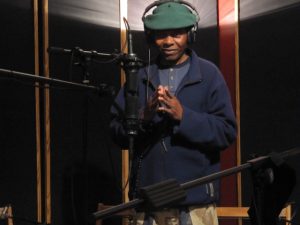As we sing our traditional songs, some people play makwa. In Korekore we say kwenje, to play kwenje. We take the staves from cattle yokes and play kwenje. That is makwa; it is called makwa in Zezuru, and kwenje in Korekore.
Makwa fits into many styles of Zimbabwean music. If we play chidzimba, makwa fits in. The song “Baya Wabaya” can have makwa, because “Baya Wabaya” is ngondo. There are those who call it “Ngondo” as its name. So now, to call it “Baya Wabaya” follows what is sung, but it is “Ngondo,” meaning, “War.”
While makwa fits into some styles, it doesn’t go together with other types of music. Those are just for playing. Makwa doesn’t go together with chipendani, or mukube. Makwa does go with ngoma, but there are some drumming songs where makwa doesn’t work. There are some songs we play, like dinhe, where you can’t keep up with the drums; it won’t work. Your hands will get sore! But if the pace is moderate, neither rushing nor too slow, then you can play makwa. It supports the dancers, because those who are dancing can get into the rhythm of makwa, and into the rhythm of the drums.
Most often, makwa has an element of encouraging people who have joined in the dancing. They will dance so powerfully, like someone who is possessed by the spirit. It comes from makwa. And makwa also supports the drums, adding another percussive element to the drumming. So, when people hear the sound of makwa, they become very serious. When you play makwa, you’ll see someone suddenly jumping up, and joining the dancers. Even someone who wasn’t dancing; you’ll see him dance! So, its influence gets inside you, and strikes you, and makes you dance. So, that is the purpose of makwa, or kwenje.


